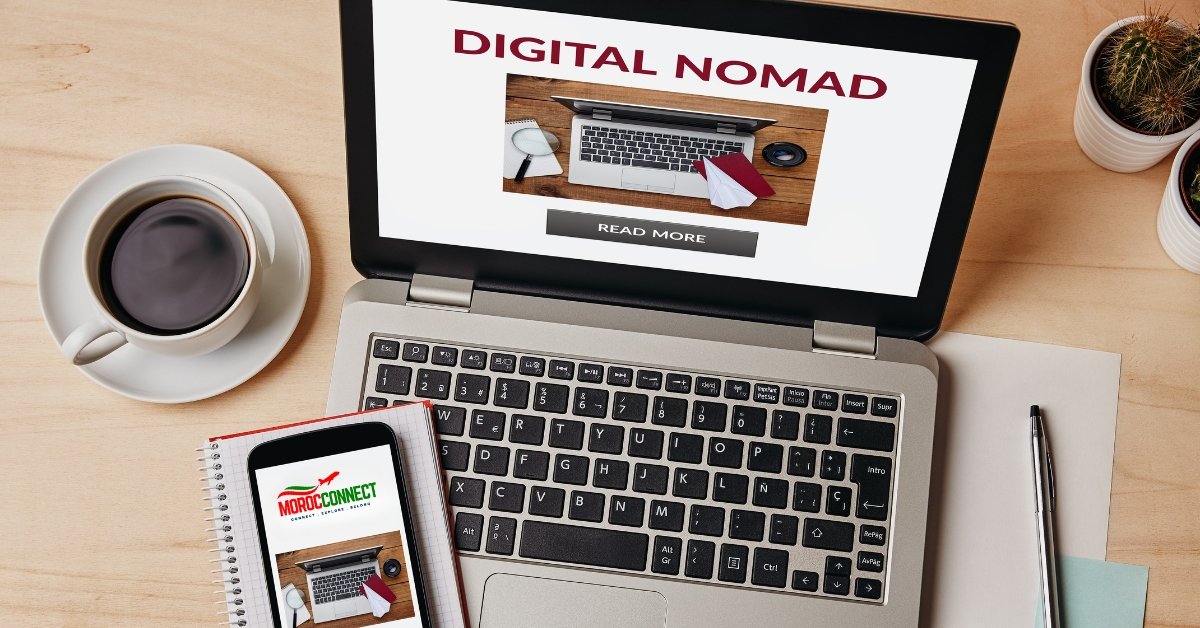Let’s be real: the fantasy of working from a Marrakech riad rooftop with a glass of mint tea is incredibly appealing. And while Morocco absolutely delivers on postcard-perfect sunsets, vibrant culture, and delicious tagine feasts, the reality of remote work here can also come with its quirks – think occasionally spotty WiFi, navigating visa rules, and the lively (sometimes noisy!) rhythm of daily life.
After spending six months immersing myself in the Moroccan digital nomad scene, I’ve learned the ins and outs, the potential pitfalls, and the truly rewarding hacks that make remote work in this captivating country not just possible, but genuinely fantastic. This guide is your blueprint to balancing productivity with adventure, ensuring you stay connected, sane, and inspired.
Whether you’re dreaming of a bustling city, a laid-back coast, or a tranquil mountain escape, Morocco offers a unique backdrop for your remote work journey. But where do you start? And how do you navigate the practicalities? Let’s dive in.
1. Morocco Digital Nomad Visa & Entry Requirements: Navigating Your Stay
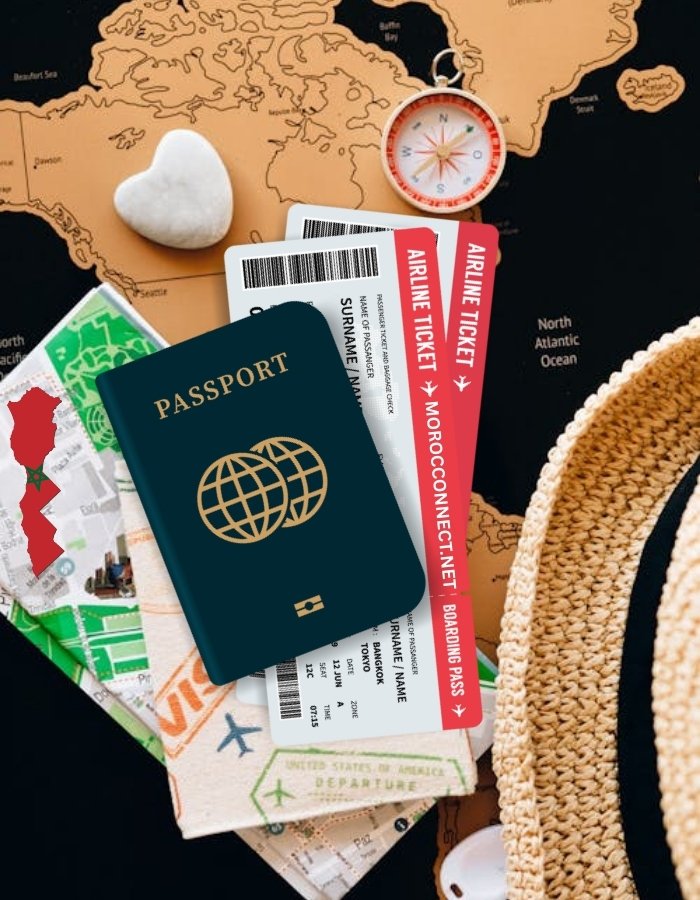
One of the first questions for any digital nomad in Morocco is: “How long can I actually stay and work from this incredible country?” Understanding the Morocco digital nomad visa situation is crucial for planning your extended stay.
Currently, Morocco does not offer a specific digital nomad visa in 2025. Most remote workers in Morocco enter the country on a standard tourist visa. For many nationalities (including those from the EU, UK, US, Canada, and Australia), this typically allows a stay of up to 90 days within a 6-month period. It’s absolutely essential to verify the specific visa requirements for your nationality well before your planned arrival, as immigration policies can be subject to change.
Extending Your Stay Beyond 90 Days: If you fall in love with the digital nomad life in Morocco and wish to stay longer, the process requires navigating local administration. While some nomads have had success extending their tourist visa for an additional 90 days at a local police station (Bureau des Étrangers), this outcome is not guaranteed and the required documentation and procedures can vary significantly depending on the city and the officials you encounter. Be prepared with paperwork proving you have sufficient financial means to support yourself and a valid accommodation address.
For those planning a longer-term stay (exceeding 6 months), applying for a residency permit (Carte de Séjour) is the more official route. This is a more involved process than a simple visa extension, typically requiring more extensive documentation. This can include proof of stable income earned from outside Morocco, a long-term rental contract, a criminal record check from your home country, and potentially a medical examination. Many digital nomads in Morocco find that hiring a local “fixer” or a lawyer specializing in immigration can be incredibly helpful, albeit an added expense (budget around $300-$500+ USD for this assistance), for navigating the complexities and potential language barriers of the residency application process.
Important Legal Consideration: While the Moroccan government has not yet introduced a specific visa for remote work in Morocco, working remotely for clients outside of Morocco is generally tolerated. The key is that you are not employed by a Moroccan company or taking jobs from local residents. Always maintain a respectful and low profile regarding your work activities and ensure you comply with all other local laws and customs during your stay.
2. Finding Your Remote Work Hub: Best Cities for Digital Nomads in Morocco
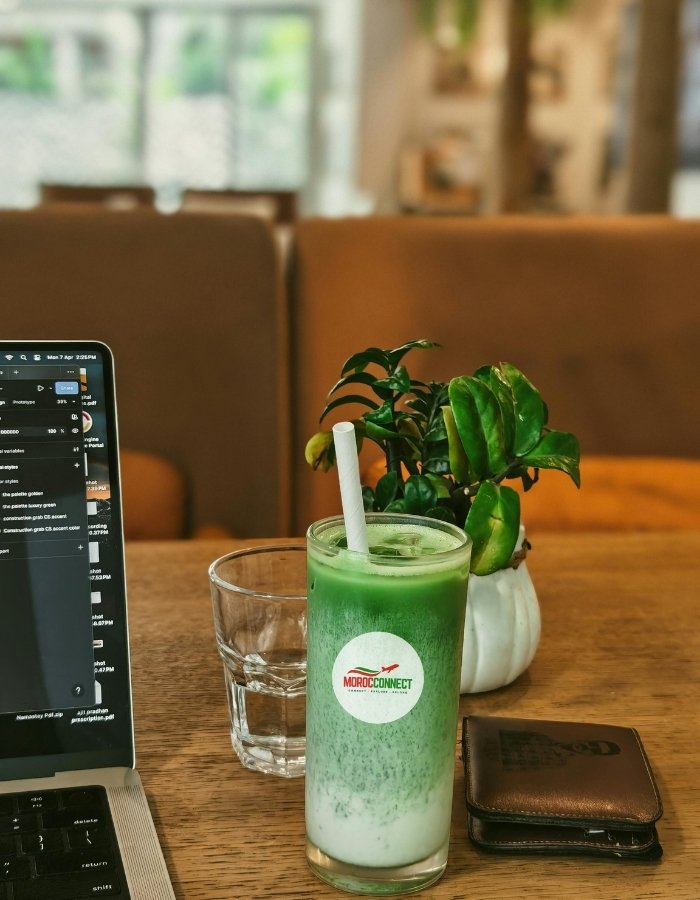
Choosing the right city is a significant factor in your experience as a digital nomad in Morocco. Each location offers a distinct atmosphere, level of infrastructure, and type of community. Here’s a deeper look at some of the best cities for digital nomads Morocco has to offer:
Marrakech: Often the first city that comes to mind, the vibrant “Red City” is a bustling hub with a large international presence.
- Pros: The biggest digital nomad Morocco community, a vast array of cafes and an increasing number of dedicated coworking Morocco spaces, incredible cultural experiences, excellent connectivity via the national train and bus networks.
- Cons: Can be incredibly fast-paced, noisy, and heavily touristed; finding reliable, high-speed WiFi in older parts of the Medina can be a challenge.
- Workspaces: Head to the Gueliz (new town) for more modern cafes with better internet. Dedicated coworking spaces in Marrakech like Coworking L’BLASSA offer reliable environments.
- Best For: Nomads who thrive in energetic, culturally rich environments and want a large pool of fellow remote workers to connect with.
Essaouira: A charming coastal town known for its relaxed vibe, historic medina, and strong Atlantic winds (perfect for kitesurfing and windsurfing).
- Pros: Much more laid-back atmosphere than Marrakech, a strong sense of community among expats and nomads, beautiful ocean views and fresh air, generally considered very safe and easy to navigate.
- Cons: Can be extremely windy, fewer dedicated coworking facilities compared to larger cities, can get busy with tourists during peak season.
- Workspaces: Café Nomad and Ocean Vagabond are popular beachfront spots with decent WiFi. NOQTA Space provides a combined coworking and coliving Morocco option in the medina.
- Best For: Digital nomads in Morocco seeking a tranquil, coastal lifestyle with opportunities for water sports and a close-knit community.
Chefchaouen: Nestled in the Rif Mountains, this stunning “Blue City” is famous for its picturesque blue-washed buildings and peaceful ambiance.
- Pros: Exceptionally beautiful and tranquil environment, ideal for focus and relaxation, great hiking opportunities in the surrounding mountains.
- Cons: Limited infrastructure for remote work Morocco, very few dedicated coworking options, internet connectivity can be less consistent than in larger urban centers.
- Workspaces: You’ll primarily rely on the WiFi in guesthouses (Riads) and a few cafes. Seek out accommodations specifically advertising strong internet for remote workers, such as Casa La Palma.
- Best For: Those prioritizing peace, natural beauty, and a slower pace of life during their digital nomad Morocco experience.
Agadir: A modern, developed city on the Atlantic coast known for its wide sandy beach and European feel.
- Pros: Good modern infrastructure, generally reliable internet access, easy to get around, pleasant climate year-round, popular with European tourists and residents.
- Cons: Lacks the traditional Moroccan charm of cities like Marrakech or Fes, can feel somewhat generic compared to other destinations.
- Workspaces: Numerous beachfront cafes offer WiFi, and there are functional coworking spaces available, though perhaps less inspiring than in other cities.
- Best For: Digital nomads who value modern conveniences, easy beach access, and a more Westernized environment.
Casablanca & Rabat: As the economic capital and political capital, respectively, these cities offer a more urban and professional environment.
- Pros: Strong infrastructure, a wider range of formal coworking Morocco spaces catering to a business clientele, more diverse amenities and international communities.
- Cons: Can be very fast-paced and less focused on the typical “nomad” lifestyle compared to tourist hotspots, traffic can be an issue.
- Workspaces: You’ll find well-equipped coworking facilities and numerous cafes suitable for working. Look into places like New Work Lab in Casablanca and Le 18 in Rabat.
- Best For: Remote workers in Morocco who prefer a big city environment, potential networking with local professionals, and access to a wide range of services.
Taghazout: A rapidly growing surf village located just north of Agadir, gaining popularity among a younger, surf-oriented digital nomad Morocco crowd.
- Pros: Vibrant surf culture, very laid-back atmosphere, a burgeoning community of like-minded individuals, plenty of coliving Morocco options.
- Cons: Can feel very tourist-centric, especially during peak surf season; infrastructure is still developing in some areas.
- Workspaces: Many surf camps, guesthouses, and dedicated coworking spaces in Taghazout are emerging. SunDesk is a well-established coliving and coworking option right by the ocean.
- Best For: Surfers and social nomads seeking a relaxed, beach-focused lifestyle with built-in community.
Consider spending time in a couple of different cities to find the environment that best suits your remote work Morocco needs and personal preferences.
3. Staying Connected: Internet, SIM Cards & Power
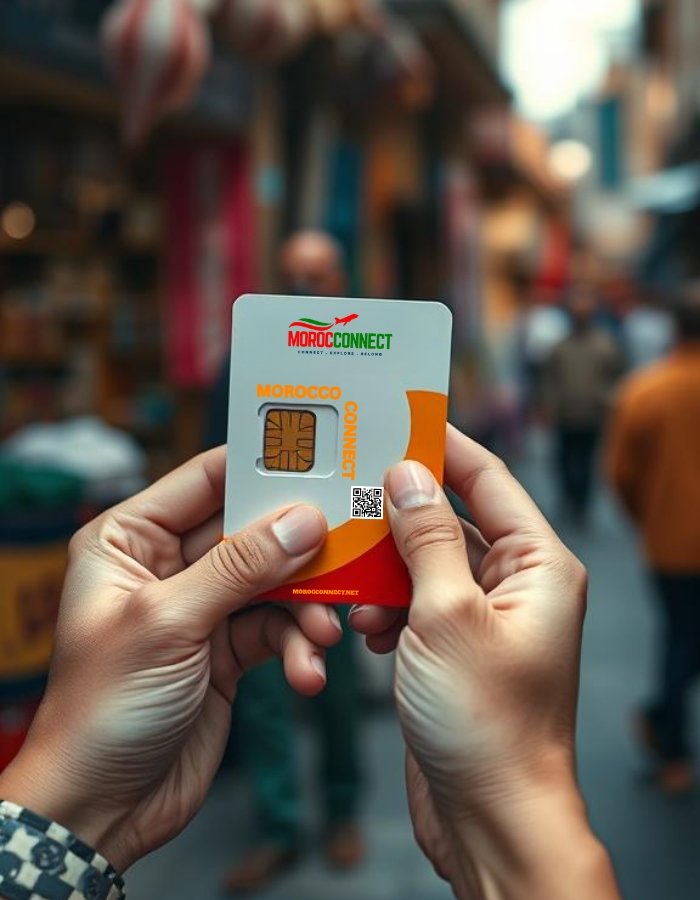
For any digital nomad, reliable internet is non-negotiable. While Morocco is making strides in improving connectivity, it’s still crucial to be prepared for potential inconsistencies, especially outside of major urban centers. Having a solid backup plan is a key “real-life hack” for working remotely from Morocco.
WiFi Reliability in Accommodation: The quality and speed of WiFi in Riads, apartments, and hotels across Morocco can vary dramatically. Before booking, especially if stable internet is critical for your work (e.g., frequent video calls), always inquire specifically about the internet speed and reliability. Don’t hesitate to ask for a recent speed test result if possible. Reading reviews from other digital nomads in Morocco who have stayed there can provide invaluable insights. Some higher-end or more modern accommodations may offer more robust internet infrastructure or even the security of a backup generator, which can be a lifesaver during the occasional power outage that can occur.
Getting a Local SIM Card for Data Backup: Purchasing a local SIM card is arguably the most essential hack for staying connected as a digital nomad in Morocco. This provides you with mobile data for working on the go, using navigation apps, and crucially, as a reliable backup for tethering if your primary WiFi connection fails. The three main mobile operators are INWI, Orange, and Maroc Telecom.
Pro Tip for SIM Cards: While you can buy SIM cards immediately upon arrival at the airport, the prices and data allowances are often less favorable than purchasing one from an official store or even a smaller, local mobile shop in a city’s medina or new town. Ask your Riad staff or a local for directions to a reputable place to buy a SIM card. You can often get very generous data packages (50GB or more) for a very affordable price (typically between $10 and $15 USD), which is usually more than enough for backup tethering and general mobile use.
Portable WiFi Hotspots: If your work requires constant connectivity and you plan to travel frequently between cities or spend time in more remote areas, renting a portable WiFi hotspot from a major provider like Maroc Telecom can be a worthwhile investment. These devices provide a private network wherever you go.
Identifying Reliable Backup Cafes: Make it a habit in each city to identify a few cafes known for having strong and stable WiFi connections. These can be invaluable if the internet at your accommodation is down or if you just need a change of scenery and a guaranteed connection for an important meeting or upload. In Marrakech, both La Famille (known for its lovely garden) and the ever-popular Café Clock are often reliable options. In Fes, Atay Café is frequently mentioned for its dependable WiFi.
4. Your Moroccan Workspace: Riads, Cafes & Coworking Spaces
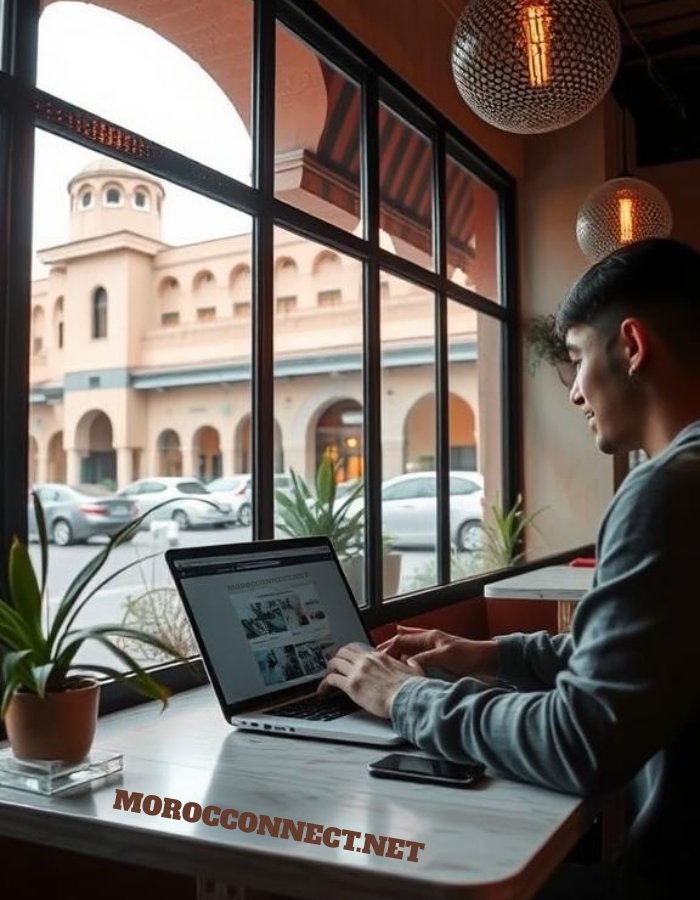
One of the joys of being a digital nomad in Morocco is the variety of unique environments where you can set up your “office.”
Working from Riads: Many digital nomads cherish the experience of working from the tranquil courtyard or rooftop terrace of a traditional Moroccan Riad. When choosing a Riad with remote work in mind, look for mentions of dedicated workspaces, comfortable seating areas, and crucially, positive reviews specifically mentioning WiFi reliability for work purposes. Searching platforms using keywords like “terrace workspace Morocco” or “Riad with reliable internet” can help narrow down your options. Some Riads are starting to cater more specifically to remote workers with better desk setups in rooms or common areas.
Coworking Cafes: These offer a more casual work environment with the added benefit of coffee, snacks, and a lively atmosphere.
- Marrakech: Beyond just a place to work, NEST Art & Wellness offers a unique blend of workspace, yoga sessions, and even the possibility of working poolside. Café Clock, a cultural institution in both Marrakech and Fes, provides a creative atmosphere and decent internet.
- Essaouira: Ocean Vagabond, located right on the beach, is perfect if you want to combine your work breaks with watching or participating in watersports.
- Fes: The Café Clock in Fes is another popular spot, offering a vibrant cultural hub alongside a functional workspace and famous camel burgers.
Dedicated Coworking Spaces: For a more professional setting, a focused work environment, and better opportunities for networking with other professionals and digital nomads, dedicated coworking spaces are increasingly available, particularly in major cities. Research options like Coworking L’BLASSA in Marrakech, New Work Lab in Casablanca, and Le 18 in Rabat. These spaces typically offer reliable high-speed internet, comfortable workstations, meeting rooms, and organized events that facilitate connecting with the local and international remote work community. While there’s a cost involved, the consistent internet and professional environment can be well worth it for productivity.
5. Cost of Living for Digital Nomads in Morocco

One of Morocco’s biggest draws for digital nomads is its affordability, especially when comparing it to popular European digital nomad destinations. The cost of living Morocco digital nomad can expect is significantly lower, allowing your budget to stretch further.
Here’s a general breakdown of typical monthly expenses, keeping in mind that costs can vary based on your lifestyle, city choice, and preferences:
- Accommodation: This will likely be your largest expense.
- Budget Room in a Riad or Guesthouse / Basic Apartment Rental: $300 – $500 USD
- Mid-Range Apartment or Comfortable Riad Stay: $500 – $800 USD
- Higher-End Apartment, Riad, or Villa: $800+ USD
- Food: Eating local is incredibly budget-friendly and delicious.
- Eating Local (Tagines, couscous, street food): $10 – $20 USD per day
- Eating at Western-style cafes or restaurants: $20 – $40+ USD per day
- Groceries for cooking at home: $50 – $100 USD per week
- Transportation: Getting around within cities and between them is generally affordable.
- Local Taxis: Very inexpensive, but confirm the price or insist on the meter before starting the journey.
- Inter-city Buses & Trains: Reliable and affordable options like CTM (buses) and ONCF (trains for northern routes).
- Grand Taxis (shared inter-city taxis): A budget-friendly but less comfortable way to travel shorter inter-city distances.
- Coworking Space: A dedicated hot desk can range from $100 to $200 USD per month.
- SIM Card & Data: Very affordable, typically $10 – $20 USD per month for a large data allowance.
- Miscellaneous Expenses: (Activities, entertainment, etc.): This is highly variable based on your interests.
Overall Monthly Budget: A comfortable estimate for the cost of living for a digital nomad in Morocco could range from $1000 to $2000+ USD per month. Cities like Marrakech and Casablanca will generally be on the higher end of this scale compared to places like Essaouira, Chefchaouen, or smaller towns. Your choice of accommodation and how often you eat out will be the biggest factors influencing your budget.
6. The Digital Nomad Lifestyle in Morocco: Community, Culture & Challenges
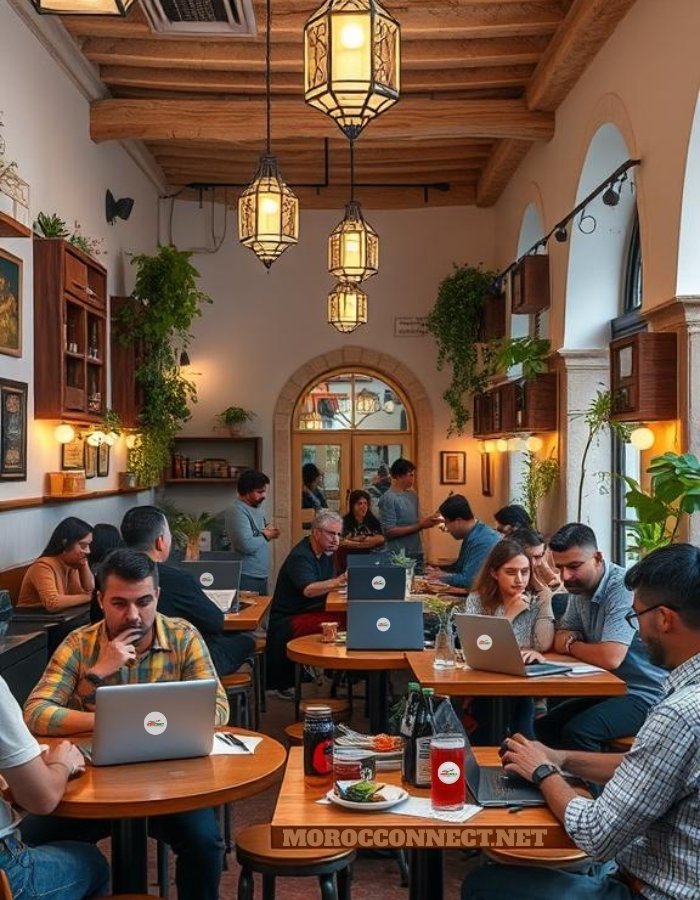
Embracing the digital nomad life in Morocco means immersing yourself in a rich and vibrant culture, but it also comes with unique challenges and requires cultural sensitivity.
Finding Community: While not as saturated with digital nomads as some Southeast Asian hotspots, there is a growing and active digital nomad Morocco community. Facebook groups are an excellent starting point for connecting with others, asking questions, finding meetups, and getting local recommendations. Search for groups like “Digital Nomads Morocco,” “Marrakech Digital Nomads,” or city-specific groups. Attending events at coworking spaces or staying in coliving Morocco houses are also great ways to meet fellow remote workers.
Cultural Immersion & Nuances: Morocco is a predominantly Muslim country with deep-seated traditions. Respecting local customs is paramount. This includes dressing modestly, particularly for women and especially when visiting religious sites like mosques. Be mindful during the holy month of Ramadan, when fasting is observed from sunrise to sunset, and it’s considered respectful to avoid eating, drinking, or smoking in public during fasting hours. Learning a few basic phrases in Moroccan Arabic (known as Darija) will significantly enhance your interactions with locals and is genuinely appreciated. Phrases like “Assalamu alaykum – السلام عليكم” (peace be upon you – a common greeting) and “Shukran – شكرا” (Thank you) will go a long way, and knowing responses like “Bla Jmil – بلا جميل” or “Ahlan wa sahlan – أهلا وسهلا” (both meaning “You’re welcome”) is also helpful.
Common Challenges of Working Remotely in Morocco:
- Noise Levels: Especially if you choose to live in or near a bustling medina, be prepared for noise. The call to prayer, the lively sounds of the souks, and general street activity are all part of the experience. Investing in good noise-canceling headphones is highly recommended for focused work sessions.
- The “Hustle”: In tourist heavy areas, you may encounter persistent touts offering tours, goods, or services. Learning to politely but firmly say “La shukran” and continuing on your way is an essential skill.
- Bureaucracy: As touched upon with visas and residency, dealing with administrative tasks in Morocco can sometimes be slow and require patience and persistence.
- Language Barrier: While French is widely spoken, particularly in business and tourist areas, and English is becoming more common in tourist hotspots, Arabic is the official language. Learning some basic Darija or having a translation app handy will be very helpful for daily interactions outside of the main tourist trails.
Safety and Well-being: Morocco is generally considered a safe country for tourists and digital nomads. However, like any country, it’s wise to be aware of your surroundings, particularly in crowded areas or at night. Keep valuables secure and be cautious of scams, which can occur in tourist areas. Travel insurance is highly recommended to cover unexpected medical issues or loss of equipment. Access to healthcare is available, with good clinics and hospitals in major cities.
Taxes on Foreign Income: For digital nomads in Morocco who are not official residents and earn their income from outside the country, there is currently no Moroccan income tax obligation. However, it is absolutely crucial to understand and comply with the tax laws of your home country and any other countries where you may have tax residency obligations.
7. Practical Hacks & Essential Tips for Your Morocco Remote Adventure

Drawing from my experience, here are some additional practical tips to help you navigate the practicalities of your digital nomad Morocco experience:
- Getting Around Morocco:
- Taxis: In cities, agree on a price before starting your journey or ensure the driver uses the meter if available (more common in larger cities like Casablanca and Rabat).
- Trains (ONCF): The national train network is comfortable, efficient, and connects most major cities in the northern part of the country (e.g., Tangier, Rabat, Casablanca, Marrakech, Fes). It’s a great option for inter-city travel.
- Buses (CTM and other companies): An extensive bus network connects cities and towns across Morocco, including areas not served by the train. CTM is generally considered a reliable and comfortable option.
- Grand Taxis: These are shared taxis that travel set routes between cities or towns. They are a very affordable way to travel but can be crowded and less comfortable.
- Managing Your Money: The local currency is the Moroccan Dirham (MAD). You generally cannot import or export Dirhams. Exchange foreign currency upon arrival at the airport or exchange bureaus, or withdraw Dirhams from ATMs, which are widely available in cities. Credit cards are accepted in larger establishments, but cash is essential for markets, smaller shops, cafes, and taxis.
- Embrace the Cuisine: Don’t leave Morocco without trying a variety of tagines (slow-cooked stews), couscous (traditionally served on Fridays), pastilla (a savory-sweet pastry), and a wide array of delicious street food like grilled meats and msemen (flatbread). And of course, enjoy copious amounts of Moroccan mint tea!
- Packing Essentials: Beyond your work gear, pack layers suitable for varying temperatures, especially if traveling between different regions (coast, mountains, desert). Comfortable and sturdy walking shoes are a must for exploring medinas and historical sites. A universal travel adapter is necessary for electronics.
- Stay Hydrated: Drink plenty of water, especially during warmer months and in hotter regions. While tap water is generally treated in cities, many people, including locals and expats, opt to drink bottled water.
- Be Patient and Flexible: Things in Morocco sometimes operate on “Inshallah” time (God willing). Be prepared for potential delays or unexpected changes, and maintain a flexible and patient attitude.
Ready to Experience the Easy Life as a Digital Nomad in Morocco?
Morocco offers a truly captivating and rewarding experience for digital nomads seeking adventure, cultural immersion, and affordability. While it presents a different set of challenges compared to more established remote work destinations, the vibrant culture, stunning landscapes, delicious food, and the warmth of its people make it an unforgettable place to live and work.
With careful planning, a willingness to embrace the unexpected, and the practical hacks outlined in this guide, your digital nomad Morocco journey in 2025 can be incredibly fulfilling and, dare we say, even easy!
Are you planning to work remotely from Morocco? Do you have questions about specific cities, finding the best WiFi, or navigating the local scene? Drop your questions in the comments below, and I’ll be happy to share more insights and help you crack the code to your own Moroccan adventure!

